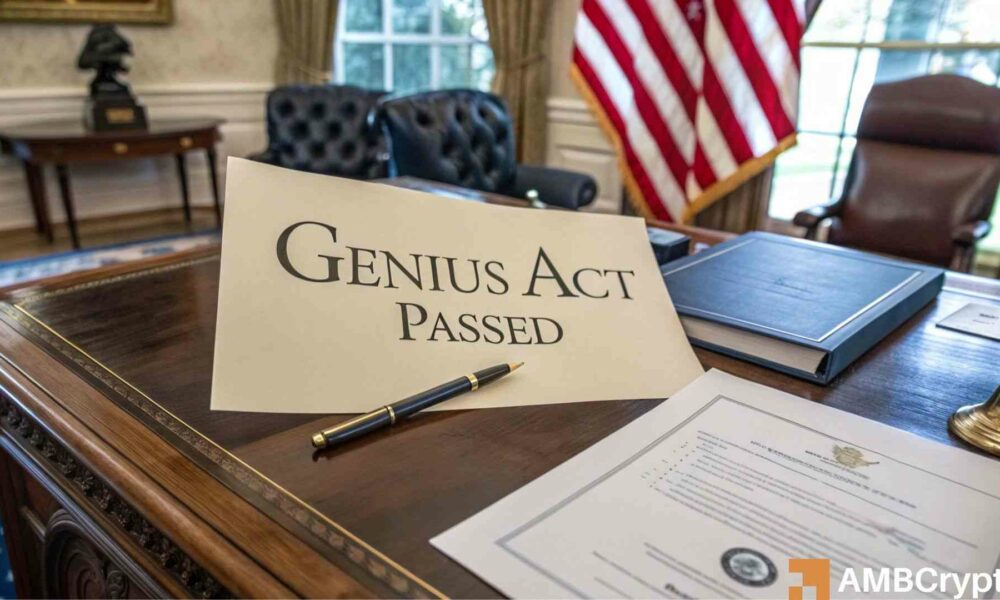U.S. House Clears Stablecoin Bill: A Game Changer for Crypto
In a historic move for the cryptocurrency industry, the U.S. House has passed the GENIUS Act, a stablecoin bill that now awaits President Donald Trump’s approval to become law. This legislation, garnering a 308-122 vote, is emblematic of the growing bipartisan recognition of the need to regulate stablecoins, bringing them under the umbrella of the regulated financial system. Notably, over 100 Democrats crossed party lines to support this bill, highlighting a significant shift in the political landscape concerning digital currencies.
Bipartisan Support Amidst Challenges
While the passage of the GENIUS Act may seem like a straightforward success, it was not without its challenges. The week of July 15 was designated as ‘crypto week’ for Republicans, aiming to push important legislation through Congress, including the broader market structure bill known as the CLARITY Act. However, this effort faced notable opposition, particularly from Democrats led by Rep. Maxine Waters. Waters and her colleagues argued for the inclusion of presidential ethics provisions in the bills, citing concerns over potential corruption linked to the Trump family’s dealings in the cryptocurrency sphere. Moreover, apprehensions regarding the future inclusion of central bank digital currencies (CBDCs) created procedural delays, further complicating the legislative process.
A Landmark Achievement for the Crypto Industry
The approval of the GENIUS Act marks a significant milestone as the first comprehensive crypto legislation to gain traction in the United States. Industry leaders have reacted positively to the news, labeling it as a crucial step toward legitimizing regulated payment stablecoins. Ripple’s founder, Brad Garlinghouse, emphasized its importance, calling it a “major financial bill” since the 2008 financial crisis, underlining its transformative potential. Moreover, Ripple’s legal chief, Stuart Alderoty, expressed optimism that this legislation would promote innovation while also safeguarding consumer interests—an outcome that has been long sought after by many Americans engaged in the crypto space.
Reactions from Key Industry Figures
Key personalities in the crypto industry expressed their views on this landmark development. Coinbase’s founder, Brian Armstrong, celebrated the passage but reminded that the work is not finished until the CLARITY Act also reaches Trump’s desk. SEC Chair Paul Atkins echoed these sentiments, stating that the GENIUS Act is a vital measure designed to spur innovation by establishing clear regulatory frameworks for the crypto ecosystem. Such endorsements from influential figures reinforce the consensus that stablecoin regulation is essential for the industry’s future growth and stability.
The Future of Stablecoins and Digital Currency
With the GENIUS Act on the cusp of becoming law, the future of stablecoins looks promising yet complex. While the bill aims to integrate stablecoins into the broader financial system, it also opens the door for further discussions on the role of CBDCs and their implications for monetary policy. The ongoing debates around regulation and ethical considerations are likely to shape the trajectory of digital currencies in the U.S., ensuring that stakeholders remain vigilant and engaged.
Conclusion
As the GENIUS Act moves closer to becoming law, the cryptocurrency industry stands on the brink of a new era. The bipartisan support for the bill reflects a growing acknowledgment among lawmakers of the potential and necessity of regulated digital currencies. While challenges remain, this legislative achievement represents a vital step toward integrating stablecoins into the traditional financial system, fostering innovation, and enhancing consumer protection. As the industry continues to evolve, the implications of this legislation will undoubtedly resonate through both financial markets and regulatory frameworks, paving the way for a more inclusive and robust crypto ecosystem.
















